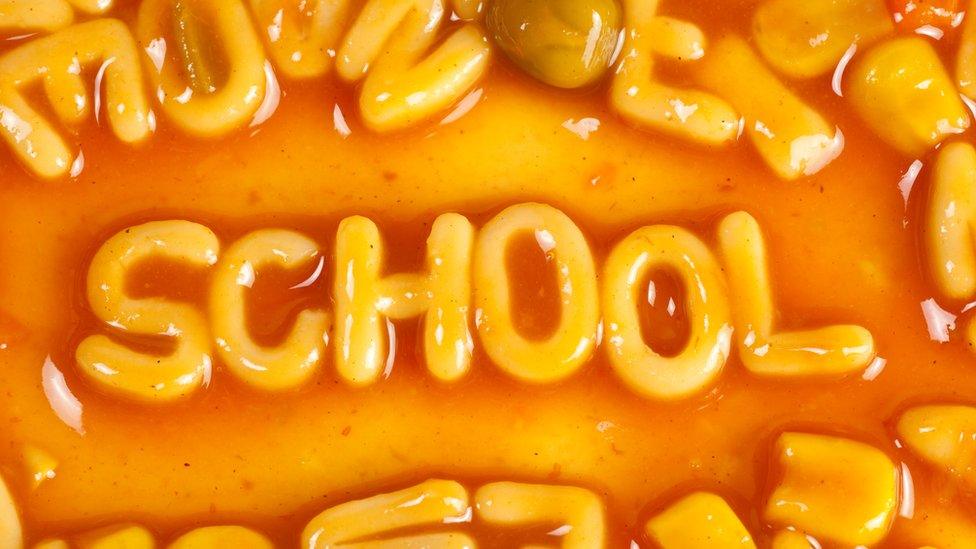Covid: Who gets free school meals in Wales?
- Published
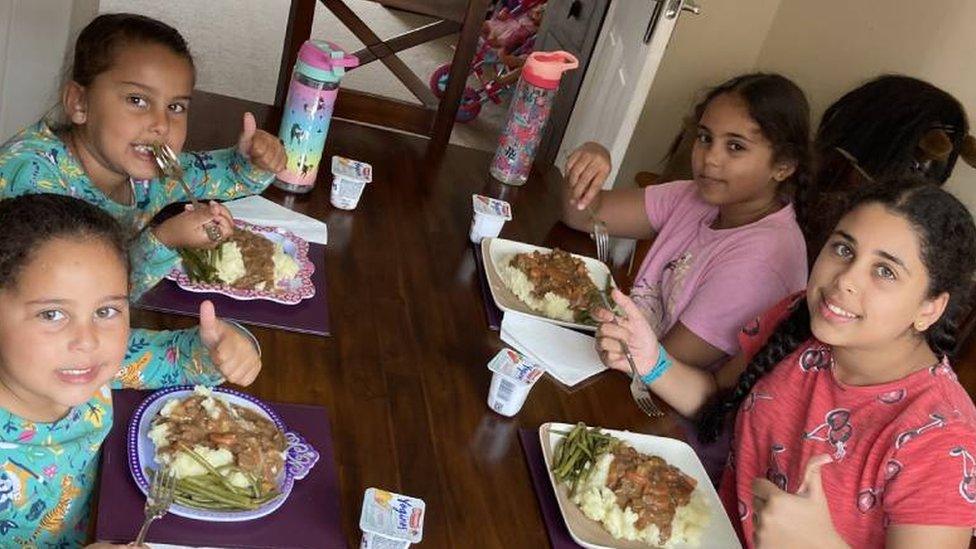
Pupils eligible for free school meals - like the Andu girls in Caerphilly - currently receive the equivalent of £19.50 a week each as a food parcel, cash or a voucher
More than 85,000 children are eligible for free school meals in Wales - but what happens when schools are closed in a national lockdown?
According to Welsh Government figures, 85,731 pupils aged between five and 15 years old can access free school meals.
During lockdown, each child gets £19.50 per week instead - as a voucher, direct payment or a food parcel.
Some have criticised the quality of food hampers, adding they reinforced stigma.
What do pupils get instead of free school meals?
The Child Poverty Action Group said children in Wales received the most generous cash alternative to free school meals in the UK during lockdown.
The cash value of food vouchers is £3.90 per child, per day, or direct payments of £19.50 can be made so families can buy their own supplies.
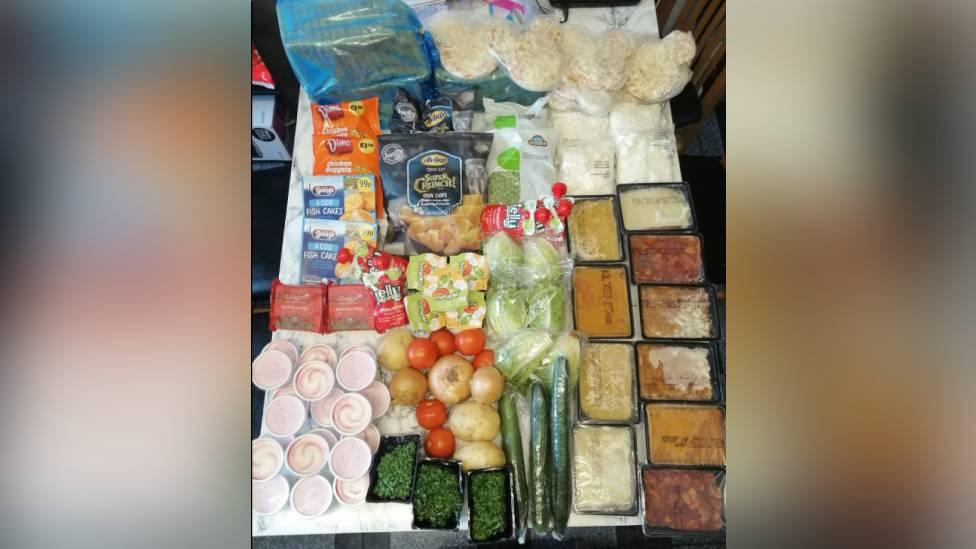
One of the food parcels Caerphilly County Borough Council supplies for three children for two weeks
But some councils have decided to spend this allocated amount on food parcels delivered directly to families.
In Caerphilly, eligible families receive a meal box every fortnight, which includes frozen meals, staple items and fresh produce such as bread, milk and vegetables.
The council said its catering team had worked with local suppliers such as Castell Howell Foods to develop the boxes and tailor menus to cater for a range of dietary requirements.
The council delivered its millionth food parcel at Christmas to the Booton family.
Mother-of-three Rachel said: "I'm a single mother and I don't work because I'm a carer for my eldest child, he's 16 and disabled. I also have a son who is 13 and a daughter who is 11.
"The food parcels have meant the world to me. It's helped me out so much - I'm amazed with the variety of food. I'm really grateful for them."
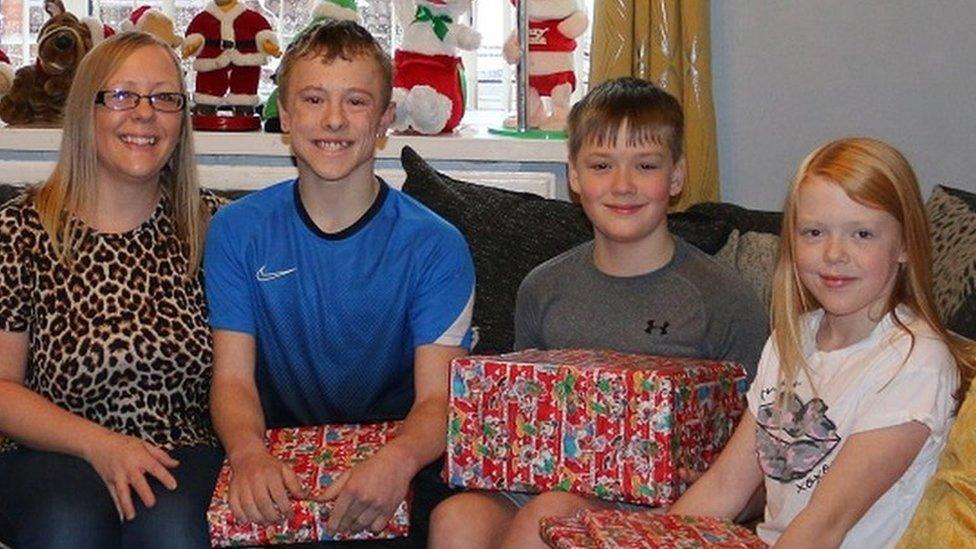
Mum-of-three Rachel Booton from Caerphilly said she was grateful for the food parcels
Judith Andu posted a photograph of her four daughters eating a meal made from their ingredients sent by Caerphilly council.
"My girls enjoying their mashed potato, green beans with beef casserole and a yoghurt," she said.
Philippa Marsden, leader of Caerphilly council, said: "From the onset of the pandemic last year we were determined to do the right thing and ensure that no pupil went hungry while schools were closed, as well as during holidays."
But not everyone is happy with the provision of food parcels, with some complaining the quality does not match the value of what families should receive.
There have been calls for cash payments instead of food parcels for children who usually get free school meals.
'Embarrassment and stigma'
Dr Victoria Winckler, director of the Bevan Foundation, said she welcomed the decision by "the vast majority of local authorities in Wales" to provide cash instead of food parcels.
"This gives families more choice about where to buy food, and they can provide meals their children like and which is nutritious," she said.
The charity recommends all local authorities should provide cash payments, "avoiding problems with the quality and quantity of food in food parcels as well as stigma".
Ellie Harwood, the Child Poverty Action Group's Wales development manager, said the organisation had campaigned for direct cash payments for families who would otherwise get free school meals.
"It's great to see the vast majority of Welsh local authorities are taking a cash-first approach," she said.
"Our research with Welsh families shows cash works much better for families because parents know where to shop locally and safely for the best-value nutritious food their kids will enjoy so there's no wastage.
"And they don't have the embarrassment and stigma of having to use vouchers."
She added a small number of local authorities continued to offer either vouchers or food parcels, and "some families have said the quality and quantity of the food doesn't adequately replace the value of the lost meal".
Allow X content?
This article contains content provided by X. We ask for your permission before anything is loaded, as they may be using cookies and other technologies. You may want to read X’s cookie policy, external and privacy policy, external before accepting. To view this content choose ‘accept and continue’.

Sarah Rees, a mother from Penarth in the Vale of Glamorgan, has campaigned for the move to cash payments, having received free school meals herself as a child.
She said: "Parents have shared images of the parcels they received, which I ran through an online shopping portal and have found to be worth much less than the £19.50 Welsh Government have allocated.
"We've even been told of some giving items to the food bank because they can't store the times to keep them fresh - one family of three children, for example, getting six loaves of bread in one week.
"This stinks of a 'beggars can't be choosers' attitude. Trusting families to choose what best suits their needs can be the only way forward."
In a statement the Welsh Government said: "We have confidence in the way that Welsh local authorities have responded swiftly to this emergency, and we are aware that local approaches are working well.
"In order to address the needs of vulnerable families, it may be necessary for local authorities to operate a number of schemes in parallel."
What do children get in England?
In England, a food parcel to the value of £15 per eligible pupil is being delivered during lockdown. The Department for Education, which has clear guidelines for parcels, will shortly be opening a similar voucher scheme to the one operational during the first school lockdown.
But the quality of these food hampers has come under fire after a mother posted photos of her family's parcel on Twitter.
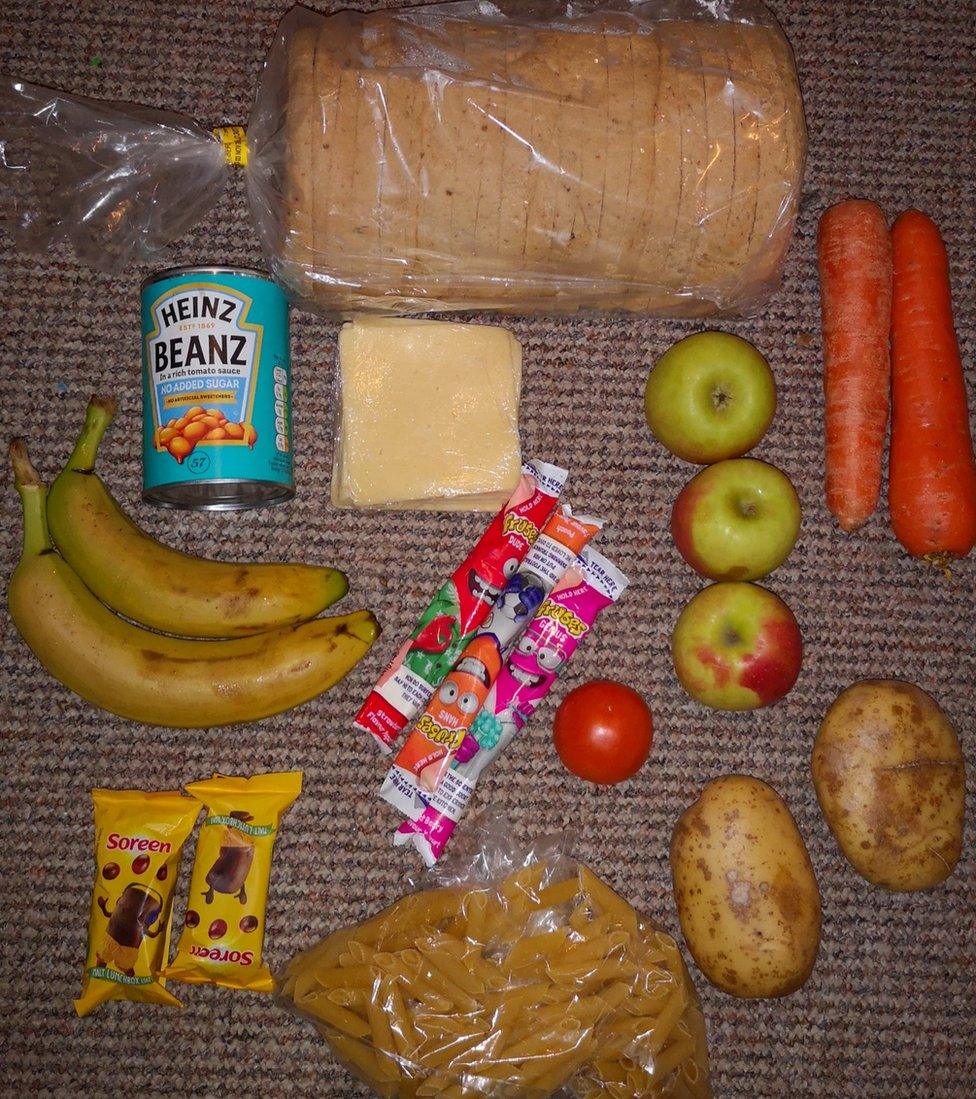
"Public funds were charged £30. I'd have bought this for £5.22," said Twitter user Roadside Mum of the parcel she received
The post, by someone calling themselves Roadside Mum, showed two carrots, two potatoes and a tin of baked beans and a small range of other food items.
She calculated the cost to be only about £5. It was meant to be worth £30 to last her children 10 school days.
Footballer and free school meals campaigner Marcus Rashford shared images, external of what appeared to be food parcels, saying they were "not good enough", that children should not go hungry and that "we must do better".
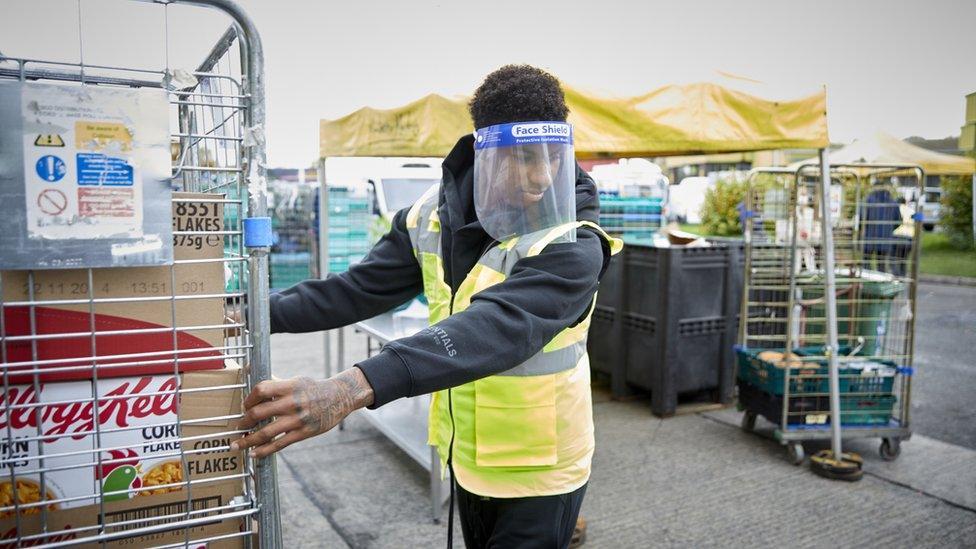
Marcus Rashford helps out at a food bank
- Published13 January 2021
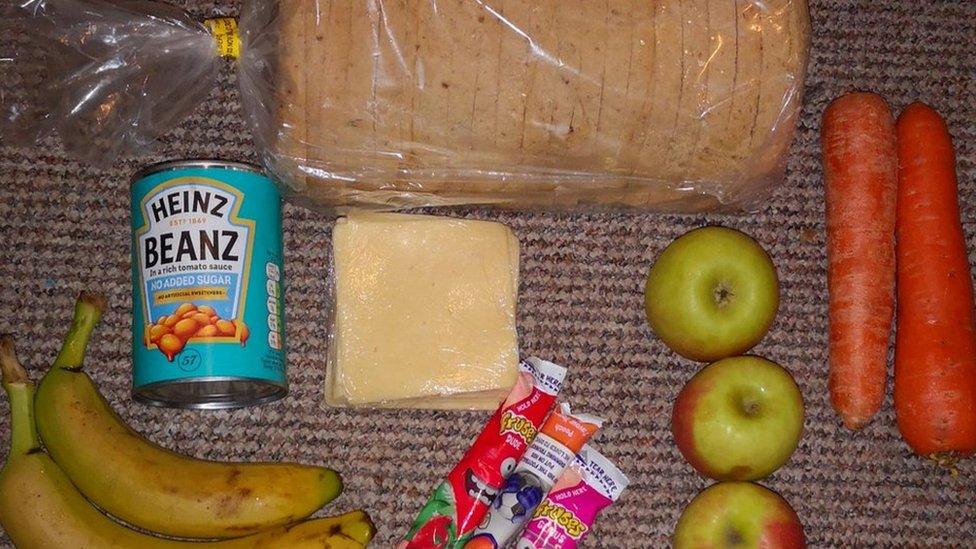
- Published12 January 2021

- Published22 December 2020

- Published15 October 2020

- Published15 October 2020
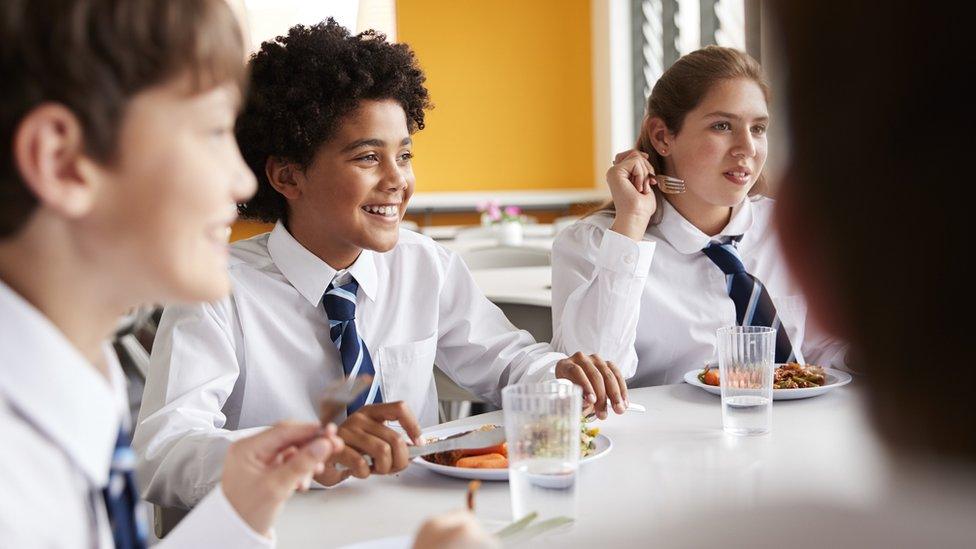
- Published6 June 2018
